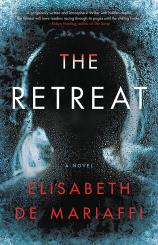The Retreat
Review
The Retreat
For the first time in years, Maeve Martin has some time for herself. The dancer and mother of two young children has extricated herself from an abusive marriage to a brutal, Svengali-like husband. Now, she’ll be spending two weeks at the High Water Center for the Arts, a remote artists’ retreat in the Rocky Mountains. But instead of a blissful period of uninterrupted creativity, what Maeve gets is a nightmarish fight for survival when an avalanche cuts the center off from the outside world.
In THE RETREAT, Canadian author Elisabeth de Mariaffi offers her own twist on the ever-popular “thriller-set-in-an-isolated-location” genre. Things seem off from the moment Maeve arrives at the center in the middle of a November rainstorm that will soon turn into a blizzard. “Be alert. All wildlife is dangerous,” warns a sign as she heads up the mountain. But the real danger lies with the center’s other residents, a group of six artists and support staff who already have established their own rhythms, loyalties and vendettas by the time she gets there. Maeve is very much the new girl in school, unsure of whom she can trust and fearful that some might not hesitate to stab her in the back. Of particular concern is Sadie, an ex-dancer and the inscrutable young assistant to High Water’s charismatic director, a former painter named Karolina, who takes an immediate dislike to Maeve.
"[Maeve] must learn to replay her instrument and declare herself as an artist and as an individual. Some of the book’s best scenes feature her working toward that goal."
An avalanche on Maeve’s third day at the center strands the group at High Water without heat, power or means of calling for help. (Somewhat implausibly, the center’s sole means of communicating with the outside world after the disaster is a small, hand-cranked radio that fails to pick up any signal.) Days pass, and no sign of rescue arrives. The temperature is dropping outside, but in the lodge it’s a hothouse atmosphere. The group grows increasingly restless, splintering into shifting factions as they debate what to do next.
De Mariaffi takes her time --- perhaps too much --- setting the stage and layering on the suspense in her deliberately paced and atmospheric book. The first death doesn’t occur until the novel’s halfway point, when one of the artists is discovered dead outside of the building one morning. Did she merely step out for a late-night cigarette and find herself locked out, with tragic results? Or is something more sinister afoot? De Mariaffi is content to leave it ambiguous. Deaths occur in THE RETREAT, but Maeve does not witness them herself, leaving the question of what exactly happened unclear.
Maeve’s response to the crisis unfolding at High Water is informed by her own past trauma. Her marriage to Iain was violent and controlling, both personally and artistically. Spending time at the retreat is meant to be a way for her to reclaim her voice and, as an aging dancer, move forward to the next stage of her career as a choreographer and director of her own troupe. But the environment at the center ends up calling up past ghosts. After she left him, Iain pursued Maeve from city to city, and that predator-prey dynamic is replicated in the book’s tense final chapter, as she finds herself being hunted across High Water’s treacherous frozen grounds.
At the beginning of THE RETREAT, Maeve reflects on the reasons she has come to High Water. Though only 34, she is, in dance terms, practically geriatric. Giving birth to two children has permanently changed her body (in private, she calls her C-section scar her “career-section”). She must learn to replay her instrument and declare herself as an artist and as an individual. Some of the book’s best scenes feature her working toward that goal. Maeve has spent much of her life following the lead of others --- first, her domineering, demanding mother, and then her husband, who “wanted her driven and exhausted.” “You could never direct, Maeve,” she recalls him telling her. “All you can do is what you’re told.” By the book’s end, she’s learned that not doing what she’s told is key to her survival.
Reviewed by Megan Elliott on July 23, 2021
The Retreat
- Publication Date: July 20, 2021
- Genres: Fiction, Psychological Suspense, Psychological Thriller, Suspense, Thriller
- Hardcover: 288 pages
- Publisher: Mulholland Books
- ISBN-10: 0316706302
- ISBN-13: 9780316706308




